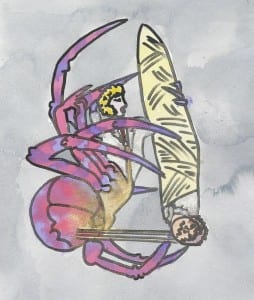
Several student species are considered “docile” creatures, who demonstrate no desire to harm their student comrades.
Sadly, there are exceptions to the rule. This week, let me introduce to an abhorrent creature that take pleasure in preying upon other student species – the Spident.
How is its sticky web woven?
Spidents feed on the suffering of their kin. This suffering is harvested through the deadly venom known commonly as “humiliation”.
As ambush predators, they wait patiently for an opportunity to strike. For example, when a student peer suggests an answer that the spident believes untrue, the Spident’s sensitive fact-checking gland (in the area of the brain where others normally store their soul) is triggered. The Spident then uses lightning quick reflexes to instantly & loudly point out this incorrectness, maximising the humiliation exacted upon their prey.
When will you encounter its deadly venom?
The species has gradually evolved and adapted different ways to use their ambush technique in a variety of situations.
In teaching sessions where a difficult question has been asked openly, Spidents employ a patient silence. Their prey, buckling under the situation’s extreme awkwardness, tentatively voice an answer, and if the Spident knows the response to be incorrect, they will pounce.
Others have learnt to build up false confidence in their prey, claiming that they “know absolutely nothing about (insert topic)”. Their prey, perceiving the predator as a fellow student in need, will rush to assist them, running headlong into the Spident’s clutches.
This is a lucrative tactic, with the student’s efforts to educate being ruthlessly picked apart by the voracious predator, leaving the student wishing that an asteroid would destroy the building and put them out of their misery.
How to avoid it
Students often fall afoul of Spidents during time in the healthcare habitats. Make sure you are wary of the species’ traps. The aforementioned call for aid is iconic of a Spident’s metaphorical web of deceit. Those rushing to aid must tread cautiously. Students must know any topic to a suitable degree so as to never expose themselves to the species’ ambushes.
Knowledge, alongside a healthy disinclination to improvise or make up facts, are the best way to avoid Spident attacks. If you never err, they will have no opportunity. The protective precursor “I don’t know, but could it be…?” further dampens the toxicity of the creature’s bite.
Spidents themselves are not infallible. On occasion, the species’ tactic of prolonged silence can lead to them be rounded upon by the tutor, forcing them into the same hazardous gauntlet as they have so frequently forced their prey. And woe betide a Spident that answers incorrectly! They themselves are then exposed in the presence of more knowledgeable, and therefore deadlier, Spidents.
A creature more to be pitied and avoided than detested, the Spident is simply a part of the habitat’s ecosystem – albeit an irritating part. A well-prepared, wary student can navigate most Spident traps with minimal difficulty.
Uploaded by Eric on 7 April 2016
